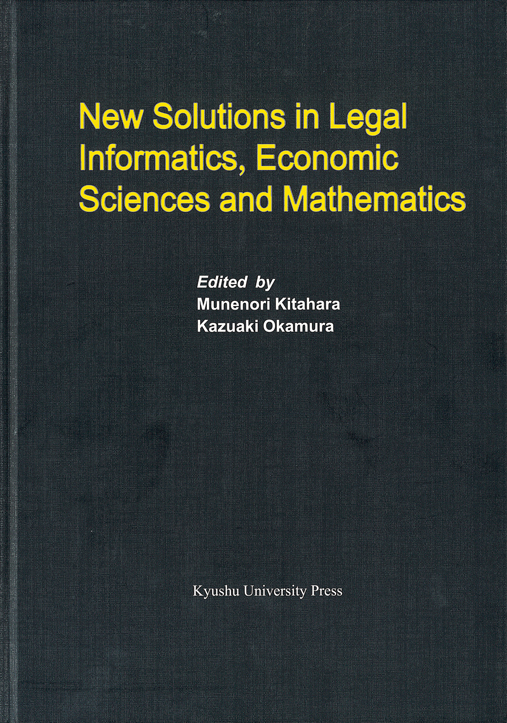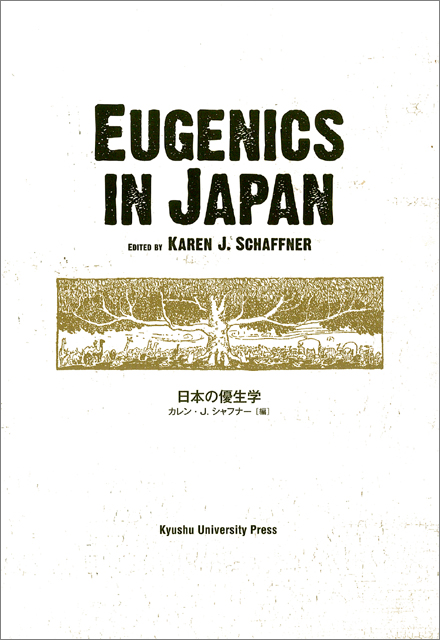- HOME >
- BOOKLIST >
- Social sciences>
- New Solutions in Legal Informatics, Economic Sciences and Mathematics
New Solutions in Legal Informatics, Economic Sciences and Mathematics
Introduction
applications to economic and managerial models. The economic sciences is based upon an
interdisciplinary education and research area of sciences economics, econometrics, statistics,
information sciences, system sciences, application information sciences, operations research and legal informatics.
Contents
A Schematic Reconsideration Takeshi Ogawa
in International Dollars Takashi Yano and Hiroyuki Kosaka
Evolution Using Pairwise Comparison Setsuko Sakai and Tetsuyuki Takahama
Irreducible Decomposition and Integral Formulas Ryoko Wada and Toshio Agaoka
Author
Munenori KITAHARA, Professor, Hiroshima Shudo University
Munenori Kitahara (LL.M) is Professor of legal informatics (Rechtsinformatik) at the Faculty of Economic Sciences and the Graduate School of Economic Sciences in Hiroshima Shudo University, Japan. He lectures “Research on Information Society,” “Legal Informatics,” and “Personal Data Protection Management System.” He was a guest professor at the Legal Informatics Institute of Hannover University in Germany (1999-2000).
He was a research member of legal expert systems (Legal Expert System Les-2, Lecture Note in Computer Science, No.264, Springer Verlag 1987). He is also a member of IVR. He presented several papers: “The Impact of the Computer on the Interpretation of Law” (ARSP Beiheft 39, 1991), “Personal Data Processing and Business Ethics” (IVR 22nd World Congress, Granada, Spain 2005), “Ethics of Cyberspace: Information Ethics and Information Moral” (IVR 23rd World Congress, Krakow, Poland 2007), “The Right to Data Protection in Digital Society” (IVR 24th World Congress, Beijin, China 2009), “The Fusion of Law and Information Technology and Law and Technology Security Standard” (IVR 25th World Congress, Frankfurt am Main, Germany 2011), “The Information Society Law in Japan” (The 3rd International Seminar on Information Law 2010, Ionian University, Corfu, Greece). “The Information Society Law : The Fusion of Law and Information Technology” (The 5th International Conference on Information Law and Ethics 2012, Ionian University, Corfu). “Law and Technology: The Fusion of Law and Information Technology” and “Law and Technology: Legal Justice through Deploying Information Technology in Law” (IVR 26th World Congress, Belo Horizonte, Brazil 2013). He also published a paper titled “Legal Justice through the Fusion of Law and Information Technology” (Legal Informatics, Economic Science and Mathematical Research, Kyushu University Press 2014).
His latest research is “Systematizing and Networking Information Society Law.” The legal system consists of twelve legal groups and some fifty acts which have been related to information, information devices and information networks. He also proposes networking the legal system, and the fusion of law and information technology. He is researching on realizing a legal justice through using information technology.
Takeshi OGAWA, Assistant Professor, Hiroshima Shudo University
Takeshi Ogawa (Doctor of Economics) is Assistant Professor of mathematics for economics at the Faculty of Economic Sciences in Hiroshima Shudo University, Japan. He lectures “Introduction to Economic Mathematics: I and II”, “Computer-Aided Economics: I and II”, and “Basic Analysis: I and II”. He was a Research Fellow at the Graduate School of Economics in Nagoya University (2011-2012).
He was a research assistant of RIETI (The Research Institute of Economy, Trade and Industry) (2008-2010, 2011-2012). He is also a member of JSRSAI (the Japan Society of the Regional Science Association International). He had presented a paper in JSRSAI: “the Joint Production and the Patterns of Specialization (Best Presentation Award of JSRSAI, 2009)”. He also had published several papers: “Classification of the Frontier in the Three-country, Three-good Ricardian Model” (Economics Bulletin, 2012), “Application of Jones' inequality to the n-country, m-good, Ricardo and Graham model” (Economics Bulletin, 2013), “Shared Renewable Resource: Gains from Trade and Trade Policy” (with Yasuhiro Takarada and Weijia Dong, Review of International Economics, 2013), and “Consumer Heterogeneity and Gains from Trade in Renewable Resource Trading” (SSRN Working Paper, 2014). Moreover, he also published a manual for Microsoft Mathematics (MS Math), which is useful free software about mathematical education from Microsoft. The manual “Leverage in economics education of Microsoft Mathematics” (Economic Science Research [Faculty of Economic Sciences, Hiroshima Shudo University], 2014) shows the way using MS Math for economic education. Recently, he has also presented several papers: “International Trade and Each Country's Management of Shared Renewable Resource” (JSIE [Japan Society of International Economics] Kansai, Osaka 2014; JIFRS [Japan International Fisheries Research Society], Tokyo 2014; SWET [Summer Workshop on Economic Theory], Otaru 2014), “Analysis with Illustration of Patterns of Specialization with Ricardian-Leontief Model” (JSME Kinki Area, Osaka 2014), “Consumer Heterogeneity and Gains from Trade in Renewable Resource Trading” (ETSG [European Trade Study Group], Munich [Germany] 2014; JEA [Japanese Economic Association], Fukuoka 2014; the 14th EAEA [East Asian Economic Association], Bangkok [Thailand] 2014). Now he is financially supported by JSPS KAKENHI Grant-in-Aid for Young Scientists (B) (2012-2015).
His latest research is “Three-Good Ricardian Model with Joint Production: A Schematic Reconsideration”: The analysis for Ricardian-Graham model with three-good cases. He focuses a suitable definition of by-product for the Ricardian model, suitable setting for using illustration for three-good Ricardian model with joint production, and classification (with 48 illustrations) about two-country, three-good Ricardian model.
Kouhei IYORI, Associate Professor, Hiroshima Shudo University
Kouhei Iyori (Ph.D) is Associate Professor at the Faculty of Economic Sciences and the Graduate School of Economic Sciences in Hiroshima Shudo University, Japan. He lectures “Simulation Theory”. He was a postdoctoral research fellow of the Japan Society for the Promotion of Science (JSPS), and visiting researcher at the Faculty of Economics in Kyoto Sangyo University (2003-2006).
He is a member of iSCIe, Institute of Systems, Control and Information Engineers. His fields of interest are experimental economics, computational economics and simulations. He published several papers: “The application of cellular automata to the consumer's theory: simulating a duopolistic market” (with Sobei H. Oda, Ken Miura and Kanji Ueda, Simulated Evolution and Learning, Springer 1999), “Price Competition Between Middlemen: An Experimental Study” (with Kazuhito Ogawa and Sobeo H. Oda, Gaming, Simulations, and Society: Research Scope and Perspective, Springer 2005), and “Prisoner's Dilemma Network: Experiments and Simulations” (System Sciences for Economics and Informatics, Kyushu University Press 2007).
Takashi YANO, Associate Professor, Hiroshima Shudo University
Takashi Yano is Associate Professor of Economic Sciences at Hiroshima Shudo University. He obtained a Ph.D. in Media and Governance from Keio University in 2010. His research field is international economics and applied econometrics, particularly, large-scale econometric modeling. Some of his papers can be found in the following journals: Developing Economies, Journal of Econometric Study of Northeast Asia, Carbon Management and Energy Policy.
Hiroyuki KOSAKA, Professor Emeritus, Keio University
Hiroyuki Kosaka is Professor Emeritus at the Faculty of Policy Management, Keio University. His research area is applied econometrics, policy coordination, qualitative game theory and peace science. Currently, he has been working on multi-country/ multi-sectoral modeling. He published many papers on applied econometrics and a book titled Model Analysis on Global System. He received a doctorate in engineering from Keio University in 1983.
Michinori SAKAGUCHI, Professor, Hiroshima Shudo University
Michinori Sakaguchi graduated from Hiroshima University, Japan in 1969 and received the Ph.D. degree in mathematics from Hiroshima University in 1980. He has worked at Hiroshima Shudo University since 1974 and he is now a professor. His current search interests are dynamic programming and linear programming in operations research, especially analysis of inventory models. He is a member of Mathematical Society of Japan, the Operations Research Society of Japan and Production Operations Management Society.
Masanori KODAMA, Emeritus Professor, Hiroshima Shudo University
Masanori Kodama was born in Hiroshima, Japan, on April 22, 1932. He received the B.S. degree in physics from Hiroshima University in 1955, and the M.S. and Ph.D. degrees in mathematics from Kyusyu University, in 1960 and 1968 respectively. He is now Honorary Professor of Kyushu University and Hiroshima Shudo University. His fields of interest include dynamic inventory problem and operations research. He is a member of JPSM, the Mathematical Society of Japan and so on.
Setsuko SAKAI, Professor, Hiroshima Shudo University
Setsuko Sakai graduated from the Faculty of Education, Fukui University, 1979. She finished her doctoral course of Informatics and Mathematical Science at Osaka University in 1984. She became a lecturer at the College of Business Administration and Information Science, Koshien University, in 1986, and then an associate professor of the Faculty of Education, Fukui University, in 1990. Since 1998, she has been with the Faculty of Commercial Sciences of Hiroshima Shudo University, where she is a professor in the Department of Business Administration. She is currently working on game theory, decision making, fuzzy mathematical programming, optimization of fuzzy control by genetic algorithms and CAI. She is a member of the Operations Research Society of Japan, Japan Society for Fuzzy Theory and Intelligent Informatics, and the Japan Society for Production Management. She holds a D.Eng.degree. She has published papers such as “Tuning fuzzy control rules by α constrained method which solves constrained nonlinear optimization problems” (1999) and “Reducing the Number of Function Evaluations in Differential Evolution by Estimated Comparison Method using an Approximation Model with Low Accuracy” (2008) in The Transactions of the Institute of Electronics, Information and Communication Engineers, “Fast and Stable Constrained Optimization by the ε Constrained Differential Evolution”, in Pacific Journal of Optimization (2009) and so on. She has also published papers in such journals as IEEE Transactions on Evolutionary Computation, Journal of Optimization Theory and its Applications, Transactions of the Japanese Society for Artificial Intelligence etc.
Tetsuyuki TAKAHAMA, Professor, Hiroshima City University
Tetsuyuki Takahama graduated from the Department of Electrical Engineering II, Kyoto University, in 1982. He finished his doctoral course in 1987. He became an assistant professor, and then a lecturer, at Fukui University in 1994. Since 1998, he has been with the Faculty of Information Science of Hiroshima City University, where he is an associate professor in the Department of Intelligent Systems. He is currently working on nonlinear optimization methods, learning of fuzzy control rules, machine learning, inference, CAI, and natural language processing. He is a member of the Information Processing Society of Japan, the Japan Society for Artificial Intelligence, the Japanese Society of Information and Systems in Education, the Association for Natural Language Processing and IEEE. He holds a D.Eng.degree. He has published papers such as “Structural Optimization by Genetic Algorithm with Degeneration (GAd)”, in The Transactions of the Institute of Electronics, Information and Communication Engineers (2003), “Constrained Optimization by Applying the α Constrained Method to the Nonlinear Simplex Method with Mutations”, in IEEE Transactions on Evolutionary Computation (2005), “Efficient Constrained Optimization by the Constrained Differential Evolution Using an Approximation Model with Low Accuracy”, in Transactions of the Japanese Society for Artificial Intelligence (2009) and so on. He has also published papers in such journals as Information Processing Society of Japan Journal, International Journal of Innovative Computing, Information and Control Journal of Japan Society for Fuzzy Theory and Systems etc.
Ryoko WADA, Professor, Hiroshima Scudo University
Ryoko Wada is a Professor at the Faculty and Graduate School of Economic Sciences of Hiroshima Shudo University. She received the Doctor Degree of Science from Sophia University, Japan, in 1988. Her major research areas are harmonic analysis on homogeneous spaces. Especially she is engaged in topics on integral representations of harmonic polynomials. She also presented at a paper titled “Fantappié Transformations of Analytic Functionals on the Truncated Complex Sphere”, M.Kitahara/K.Morioka (eds.), Social Systems Solutions by Legal Informatics, Economic Sciences and Computer Sciences, Kyushu University Press (2010).
Yoshio AGAOKA, Professor, Hiroshima University
Yoshio Agaoka is a Professor at the Graduate School of Science of Hiroshima University. He graduated from Kyoto University (Faculty of Science) in 1977, and entered the Graduate School of Science, received the Doctor Degree of Science from Kyoto University in 1985. His major research areas are Differential Geometry, Representation Theory and Discrete Geometry. Especially he is engaged in topics on local isometric imbeddings of Riemannian symmetric spaces, decomposition formula of plethysms and classification of tilings of the two-dimensional sphere, etc. Recently, he is mainly engaged in the subject on elementary geometry from the viewpoint of classical invariant theory.


